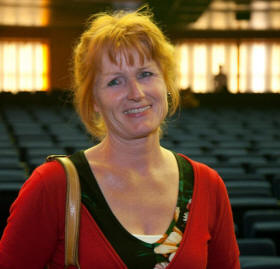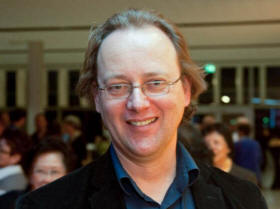(Clearwisdom.net) The artists of Shen Yun Performing Arts have been admired at every venue during their 2009 European tour, and the audience at Amsterdam's Rai Theater was no exception.
"It was absolutely wonderful," said Mr. Andrissen, a Dutch composer who saw Shen Yun for the first time on Friday, April 17.
Mr. Andrissen, a Dutch composer
He said, "The dances, the costumes, and the music that wove through the performance were truly impressive. The show gives us insight into an unknown culture. One needs to take the memories home and think about them, and then see what can be learned from everything one has seen. As a composer, I view music and choreography a little differently from the average audience member. I was raised in the Netherlands and during my youth was exposed to only Western culture and Western arts. I must say that this is a one-sided view. I have to gain familiarity with this art and way of telling stories. It has its own quality and its inner meanings. If viewed from the Asian point of view, I quickly remember my background and what I'm used to. It mirrors a unique form of art in its thoughts and expression. Modern Dutch dance is rather abstract. To express stories in this format, as is done in this show, is more direct and intuitive.
"If I were to express my feelings about the show briefly, I would say 'colorful, peaceful, and from the heart.'"
Uighur Erhu Player: "The woman plays from her soul"
A professional Erhu player from the ancient Mongol state in western China, Uighur, saw the show with his wife and said, "The woman [Ms. Xiaochun Qi] plays [the Erhu] from her soul; she is an accomplished artist who coaxes the finest tunes from the instrument--a moving performance done with lots of feeling. The audience sat so quiet, one could hear a pin drop."
According to researchers, the "Pipa" and Erhu (both ancient Chinese stringed instruments) came from the same Uighur region.
He then went on to talk about the pieces "Dignity and Compassion" and "Heaven Awaits us Despite Persecution" that expose the persecution of Falun Gong in China. He empathized with the Falun Gong practitioners, adding, "We know how they feel."
Both asked to remain anonymous for fear of Chinese Communist Party reprisal, even though they have lived in Amsterdam for 20 years.
They expressed delight with the dances that portrayed classical Chinese stories: "I am particularly fond of the Monkey King legend, because it represents Chinese culture. The dance movements are well-balanced, the dances are well-choreographed, and the backdrops complete the whole scene."
Professional Photographer: "The dancers moved like butterflies"
When the applause finally abated and most of the audience had filed out of the theater, some stayed behind, wanting to see the musicians who were part of the live orchestra. They wanted to see who so aptly played those Western and Chinese instruments, including the Pipa and the Erhu.
Ms. van Ommen, a professional photographer, peeked into the orchestra pit. She wanted to commit t o memory the faces of the artists, since taking photographs inside the theater is not allowed. She said that she captures everything with clicks, in split seconds.

Professional photographer Ms. van Ommen
She attended the show with her daughter. Ms. Van Ommen is very interested in Buddhism and Tibet and thought it was important that two pieces in the show focused on current problems in China. "One has to believe that everything will turn for the better--that things will start to get better, that people will start to listen to each other," she said.
She added, "The choreography was perfect. Holland can learn a lot about China from these artists." She was inspired by the colors and the costumes of Shen Yun. "It was inspiring. The dancers moved like butterflies. The colors were perfect. I deal a lot with colors in my life, and those here have truly inspired me."
Talking about the translated lyrics of the vocalists' songs, which transmitted a spiritual message, she said, "When dealing with one another, respect becomes more and more important."
Source: http://theepochtimes.com/n2/content/view/15557/
http://theepochtimes.com/n2/content/view/15556/
http://theepochtimes.com/n2/content/view/15601/
Category: Shen Yun Performing Arts






